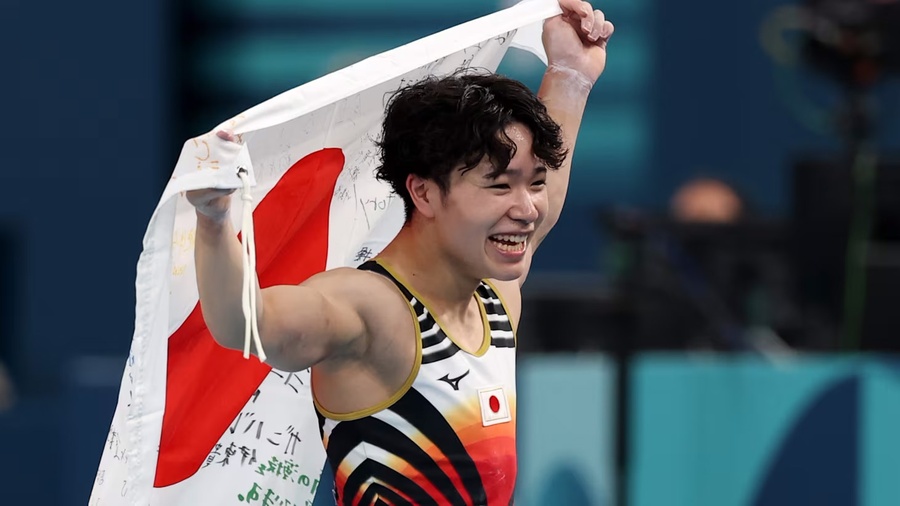Paris, France, July 31, 2024: Japan has a new hero in men’s artistic gymnastics.
On his Olympic Games debut, the 20-year-old Shinnosuke Oka won the men’s all-around gold medal on a thrilling and dramatic evening at the Paris Bercy Arena on Wednesday.
The final result was in the balance until the very end, when China’s Zhang Boheng produced a superlative performance on the horizontal bar to score 14.633 points.
Would this be enough to overtake Oka, who had finished his competition on 86.832 points?
The huge crowd, gymnasts and support teams waited anxiously until it was revealed that no, it wasn’t quite enough to overtake Oka.
The Japanese camp went wild, including the defending all-around champion from Tokyo 2020, Daiki Hashimoto, who had just lost his crown and had to settle for sixth place on this night.
Oka won gold with 86.832, Zhang silver on 86.599, just 0.233 points behind, and Xiao Ruoteng the bronze for China with 86.364 after taking silver at Tokyo 2020 behind Hashimoto.
Oka’s victory was Japan’s fourth consecutive Olympic gold in men’s all-around, following Hashimoto three years ago and the legendary Kohei Uchimura at Rio 2016 and London 2012.
It was a memorable night’s entertainment which ended with newcomer Oka celebrating his second gold medal of Paris 2024 after winning the men’s team event two days earlier – again with China in second place.
Oka said he had received a lot of advice from his teammate Hashimoto, especially before the last apparatus, the horizontal bar.
“Mr. Hashimoto kept telling me to be confident and to try my best; he was giving me this advice from the start and it gave me a lot of power,” Oka said.
“I wanted to win and, of course, I thought that if I beat Mr. Hashimoto, I would win the gold. In this Olympics it was very good that I did not make any mistakes, so I feel great. It was good that I came here as the challenger.”
Xiao said this was his last time to compete so his feelings were very intense. He described their defeat to Japan in the men’s team event as “heartbreaking” and said he had produced his A game here.
Zhang made a mistake on his first apparatus, the floor exercise, when he lost his balance and his forehead rested on the mat. This cost him, with a mark of 13.233.
On the second apparatus, the pommel horse, Hashimoto buried his face in his hands after losing his balance and being forced to dismount. Although he recovered well, his low score of 12.966 reflected this error.
After Hashimoto opened with 13.400 on rings, the Japan camp submitted an inquiry on the difficulty mark, but this was dismissed.
Oka followed Hashimoto and scored 13.666, and again the Japanese submitted an inquiry about the difficulty value. This time the score was changed, and Oka’s mark increased to 13.866.
At the half-way mark, Oka led on 42.932 from Ukraine’s Oleg Verniaiev (42.766) and Xiao in third place with 42.399.
At the end of the fourth rotation, Ukraine occupied the top two spots through 30-year-old Verniaiev (57.766) and Illia Kovtun (57.632). Oka and Xiao were tied for third place on 57.232.
Some fine performances on parallel bars moved Oka (15.100) into first place after five rotations with 72.332 points, followed by Xiao (14.766) in second on 71.998 and Zhang (15.300) third with 71.966.
The medals came down to the sixth and final apparatus, horizontal bar, and the drama had only just started.


